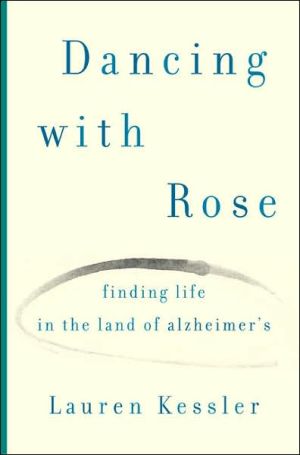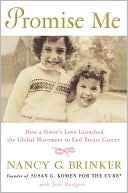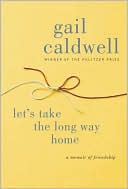Dancing with Rose: Finding Life in the Land of Alzheimer's
One journalist's riveting—and surprisingly hopeful—in-the-trenches look at Alzheimer's, the disease that claimed her mother's life \ Like many loved ones of Alzheimer's sufferers, Lauren Kessler was devastated by the ravaging disease that seemed to turn her mother into another person before claiming her life altogether. To deal with the pain of her loss, and to better understand the confounding aspects of living with a disease that afflicts four and a half million people every year, Kessler...
Search in google:
One journalist's riveting—and surprisingly hopeful—in-the-trenches look at Alzheimer's, the disease that claimed her mother's life Like many loved ones of Alzheimer's sufferers, Lauren Kessler was devastated by the ravaging disease that seemed to turn her mother into another person before claiming her life altogether. To deal with the pain of her loss, and to better understand the confounding aspects of living with a disease that afflicts four and a half million people every year, Kessler enlisted as a caregiver at a facility she calls Maplewood. Life inside the facility is exhausting and humbling, a microenvironment built upon the intense relationships between two groups of marginalized people: the victims of Alzheimer's and the underpaid, overworked employees who care for them. But what surprises Kessler more than the disability and backbreaking work is the grace, humor, and unexpected humanity that are alive and well at Maplewood. Dancing with Rose is forceful and funny, clear-eyed and compelling. An intriguing narrative about the relationships and realities of end-of-life care, it stars an endearing cast of characters who give a human face to what has always been considered a dehumanizing condition. Illuminating and beautifully written, Kessler's immersion offers a new, optimistic view on what Alzheimer's has to teach us. Publishers Weekly The growing number of readers who have relatives with Alzheimer's will warm to Kessler's excellent account of the months she worked as an unskilled resident assistant in an Alzheimer's facility on the West Coast. This facility, which she calls Maplewood, is a state-of-the-art institution, divided into small "neighborhoods" of 14 rooms with private baths, a common space and enclosed patios. The author of several nonfiction books, Kessler (Full Court Press) was attempting to resolve her feelings after her own mother, with whom she had a troubled relationship, died of Alzheimer's; bittersweet memories of her are scattered through the narrative. At Maplewood, Kessler feeds, toilets and converses with residents in varying stages of the illness. Marianne, for instance, an alert and well-dressed woman, appears not to belong at Maplewood. She still regards herself as a successful working woman, and the author treats her as such. Kessler becomes strongly attached to some of the other men and women in her neighborhood, feeling bereaved when several die during her tenure. She comes to regard Alzheimer's sufferers as individuals who can still enjoy life, given the care and recreational opportunities extended at this facility a powerful lesson in the humanity of those we often see as tragically bereft of that quality. (June 4)Copyright 2007 Reed Business Information
\ From Barnes & NobleFew diseases are more feared than Alzheimer's, depicted in the popular press as a terrifying, unstoppable juggernaut that devastates lives and robs its victims of their very humanity. In this wonderful book, Lauren Kessler challenges the traditional view of Alzheimer's patients as empty shells and dares to suggest that they may even have something to teach us. Seeking insight into the disease that claimed her mother's life, Kessler went to work for five months as an unskilled assistant in an Alzheimer's care facility. There, immersed in what she calls "the hardest and best work" of her life, she discovered an extraordinary interaction between patients and caregivers -- a relationship grounded in love, acceptance, and engagement rather than anger, fear, or shame. In this tender, funny memoir she describes her experiences and invites us to rethink our assumptions about old age and illness.\ \ \ \ \ Publishers WeeklyThe growing number of readers who have relatives with Alzheimer's will warm to Kessler's excellent account of the months she worked as an unskilled resident assistant in an Alzheimer's facility on the West Coast. This facility, which she calls Maplewood, is a state-of-the-art institution, divided into small "neighborhoods" of 14 rooms with private baths, a common space and enclosed patios. The author of several nonfiction books, Kessler (Full Court Press) was attempting to resolve her feelings after her own mother, with whom she had a troubled relationship, died of Alzheimer's; bittersweet memories of her are scattered through the narrative. At Maplewood, Kessler feeds, toilets and converses with residents in varying stages of the illness. Marianne, for instance, an alert and well-dressed woman, appears not to belong at Maplewood. She still regards herself as a successful working woman, and the author treats her as such. Kessler becomes strongly attached to some of the other men and women in her neighborhood, feeling bereaved when several die during her tenure. She comes to regard Alzheimer's sufferers as individuals who can still enjoy life, given the care and recreational opportunities extended at this facility—a powerful lesson in the humanity of those we often see as tragically bereft of that quality. (June 4)\ Copyright 2007 Reed Business Information\ \ \ Kirkus ReviewsClose-up look at life inside an Alzheimer's care facility. When her own mother had the disease, Kessler (Clever Girl, 2003, etc.) placed her in a care facility and visited only reluctantly. Determined to redeem this thoroughly unsatisfactory experience, the author immersed herself in academic research on the subject, then took a job as an attendant in an Alzheimer's care facility. Although she did not go undercover like Barbara Ehrenreich (Nickel and Dimed, 2001), she does provide a similar expose of the miserable conditions endured by minimum-wage workers, in this case the undereducated, underpaid and overworked women who care for our society's institutionalized ill and aged. Unlike them, Kessler got to choose her working hours and was not there to earn a living. She wanted to comprehend firsthand what caretakers do, to connect with the residents and to understand their lives. What began as a short-term venture to gather material for a magazine article turned into months of work and observation, now expanded into this full-length narrative. The author's graphic depiction of a caretaker's daily routine-bathing, dressing, feeding and taking to the toilet old men and women who are often demanding and uncooperative-makes caring for a newborn seem a breeze. However unsavory the physical chores are, however, Kessler finds the experience immensely rewarding on an emotional level. She connects with these Alzheimer's patients in a way she never could with her own mother. They make her feel needed, and she can be the daughter she never was, if only for a while. Kessler doesn't scant the job's numbing routine and frequent frustrations, but she is ever alert to small joys and simple kindnesses. Shelearns to accept rather than argue with the patients' view of reality, thereby soothing their anxieties. Offers an informative lesson and a comforting message for anyone with an afflicted family member. Agent: David Black/David Black Literary Agency\ \








